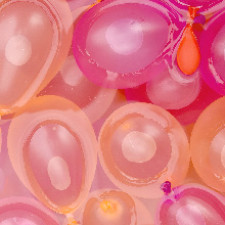The effect of alcohol on your health
You have to come from another planet if you don't know that excessive alcohol consumption is bad for your health. A glass of wine or beer from time to time can hardly hurt anyone, but if alcohol consumption takes on serious proportions, this can have disastrous consequences. What is the impact of alcohol on your body and what damage can you do yourself by consuming too much alcohol?
When do you drink too much alcohol?
It is claimed that more than two glasses of alcohol a day is the limit. Depending on your type of body and how your body functions, two glasses may be a little too much for one person, while the other person can have a little bit more. Alcohol consumption that far exceeds the above units is harmful to body and mind.
Some damage is temporary and will recover after reducing alcohol consumption. Other damage to your body or mind can be irreversible and even life-threatening. If alcohol leads to death, this is, in most cases, an indirect consequence and only rarely a direct consequence.
The direct effect of a few glasses of alcohol
Within 30 seconds, alcohol starts to affect within your body, while your body sometimes needs 2 to 3 hours to process and break down the amount of alcohol it consumes. Direct consequences of alcohol consumption are:
Mood swings: You have less control over your emotions and can even become very down, angry, or cheerful for no reason at all.
Reduced reflexes: Your reaction speed decreases without you realizing it.
Reduced balance: Your balance organs do not work properly, making you stand and walk less stable.
Memory loss: Your long term memory stores less, so you don't know everything the next day.
Less logical thinking: Your reasoning skills are diminishing.
Not all of the above consequences need to be permanent in case of excessive alcohol consumption, but that is possible. Because, over time, your brain will shrink from the alcohol, it can continue to become so that the chance of recovery is small.
The direct effect of one-time excessive alcohol consumption
When consuming too much alcohol, your body cannot process this quickly enough. Your liver cannot handle the toxins, and the alcohol remains in your blood. This results in the following symptoms:
Vomiting: The poison wants to leave your body, and if that is not possible through the purifying effect of your liver, then your body wants to discharge poison through your esophagus, which makes you vomit.
Temperature changes: Because alcohol widens your blood vessels, more blood gets into your skin. At first, that gives you a warm feeling, and you start blushing, but that's only for a short time. This is because the heat can leave your body faster, which can cause your temperature to drop very quickly.
Increased blood pressure: More often, in case of prolonged and excessive alcohol consumption, than if it occurs once, your blood pressure can rise. The hormones that are released during this process constrict your blood vessels so that your heart has to pump faster to circulate enough oxygen.
Poor sleep: Although we often get tired of too much alcohol and can fall asleep quickly, this does not mean that you sleep well and actually rest. Not only can you wake up more often for a visit to the toilet, but you also sleep more restlessly and have shorter REM sleep.
A hangover: Because alcohol dries you out, the blood fibers in your body and brain expand. It results in headaches. If your body still hasn't been able to process all the toxins the next day, you will still tend to want to vomit. The lazy and tired feeling you feel about a hangover comes from the fact that your liver has not been able to put enough sugar in your blood into circulation. It can also make you shake.
The temporary effect of prolonged and excessive alcohol consumption
You can speak of long-term excessive alcohol consumption if you consume much more than two glasses of alcohol per day for months on end. Although the symptoms may be different for everyone, most people suffer from the following conditions to a greater or lesser extent.
Stomach ulcers: Alcohol irritates the stomach wall, and this can cause ulcers. These are often not only painful but also cause you to be less hungry.
Vitamin deficiency: Due to a reduced feeling of hunger. Because your body is more concerned with processing toxins than with the absorption of vitamins from the food you do eat, a vitamin deficiency arises. It reduces your body's vital functions, reduces your vitality, affects your thinking ability, and makes you lose your zest for life.
Diarrhoea: Your small and large intestines become irritated by alcohol. As a result, food is no longer appropriately digested, and diarrhea occurs. As a result, vitamins and minerals are no longer sufficiently absorbed by the body, which means that vital body functions are no longer able to function correctly.
Flaming heartburn: Because the muscle that closes your stomach from your esophagus weakens, heartburn occurs and rises. It tastes dirty, smells unpleasant, and can sometimes be very painful.
Kidney failure: Your kidneys process all the poison in your body. Long-term exposure to too many toxins can cause your kidneys to fail, literally poisoning your body because these substances can no longer leave the body. It is also called alcohol poisoning and can also be caused by a single overdose of alcohol.
Reduced immune system: By decreasing the necessary vitamins and minerals, your immune system also weakens. You are more likely to be ill and need longer recovery time.
Hormonal abnormalities: Alcohol influences your hormonal balance. Women no longer have their period, and men can have erectile dysfunction. Hormones also regulate your weight to some extent so that we can gain weight.
Weight increase: Your body converts alcohol into fat. You become more fat and will retain more fluid.
Thinner bones: Because alcohol affects your calcium absorption and levels, your bones become thinner. Your muscle tissue also decreases, which means that fractures are more likely to occur.
The incurable effect of prolonged and excessive alcohol consumption
Although there are known cases in which a permanent medical condition caused by long term and excessive alcohol consumption is cured, the chance of curing remains small. Permanent disorders are:
Liver cirrhosis: Alcohol makes your liver fat, and a layer of thick tissue forms around the liver. The blood can no longer flow freely, causing cells to die and irreparable scars to form. These scars are called cirrhosis of the liver and ultimately lead to failure of the liver function. Without the functioning of the liver, we die.
Heart failure: Alcohol makes our heartbeat irregular and therefore weakens our heart muscle. A weakened heart muscle is an irreparable damage to our body. If your heart can't circulate the blood in your body fast enough, vital functions get too little oxygen, and we die.
Pancreas failure: The pancreas is responsible for the insulin in your blood, among other things. Prolonged and excessive alcohol consumption irritates the pancreas, which can lead to irreparable damage. This damage results in diabetes with all its consequences. Diabetes can be fatal.
Hearing loss: Excessive and prolonged alcohol consumption damages your hearing, and that is irreparable. It can even lead to complete deafness.
Alcohol and addiction
Alcohol addiction can have many negative consequences for yourself and your environment. However, this does not mean that you are always addicted when you consume alcohol for a long time and excessively.
If addiction means that you often can't resist the temptation of a drink, then there are a lot of happy and well-functioning addicts in this world. In many cultures, alcohol is so well integrated that you may not speak of addiction at all. It is rather a matter of socially acceptable behavior or an escape from an unpleasant situation. Research has shown that if you take people like this out of their environment and put them in a pleasant environment, the need for alcohol disappears completely.
When do you talk about alcohol addiction?
Although the opinions differ, you could speak of alcohol addiction if the majority of the symptoms below apply to the person:
Loss of social contacts: Loss of social contacts due to misconduct resulting from alcohol consumption is common. Someone can become aggressive or depressed from alcohol consumption, as a result of which their friends and family will want to distance themselves from it. It does not mean, however, that alcohol abuse is the real cause of the behavior. Perhaps alcohol abuse is a consequence of losing social contacts and the feeling of loneliness.
Reduces functioning: Often arriving at work too late and no longer being able to function optimally due to alcohol abuse. It must be ruled out that there is no lack of motivation problems or that the work pressure can be too high.
Daily alcohol abuse: Consuming a lot of alcohol a day is generally seen as an addiction. Liters of beer or a bottle of gin a day can be called alcohol addiction. A distinction between an unhealthy habit and an addiction is essential here.
Depression: Many people are depressed without knowing it themselves and therefore start drinking (much) more. Often the alcohol problems are solved when the depression has healed.
Sneaky drinking: Usually, this is a clear signal that someone is (becoming) addicted. Especially if this happens in the morning; however, due to the taboo regarding excessive alcohol consumption, the sneaky behavior can also be explained in other ways.
The effect of alcohol on your appearance
Alcohol has a detrimental effect on your skin, and this can become apparent when you drink regularly. Because you experience the process from day to day, you won't notice much of it yourself. If you see the difference between someone who suddenly decides not to drink after months of drinking, then the result is astonishing.
Unanimously, people who do not drink for a month after a heavy drinking period are happy with the mental and physical differences they experience.
When is excessive alcohol consumption bad for you?
What people believe about alcohol addiction varies by culture and origin. Some cultures and religions ban alcohol consumption completely, and others stimulate it. Some hold on to no more than two glasses of alcohol a day, and others refuse to believe that there is such a thing as an alcohol addiction.
A liberal tendency is that excessive alcohol consumption is only bad if you have problems with it yourself or cause problems for others, for example, by getting behind the wheel with alcohol or by displaying aggressive behavior.
If you want to know more about alcohol use or abuse, you can always call someone with experience in this field via TheONE. You call via a video connection and pay per minute for the advice. The first minute is free.
-
Rose Marie NelsonLife Coach€ 2,09 pm
-
Mallory Balesspiritual life coach€ 0,94 pm
-
Anouk ElzermanPsychologist€ 0,33 pm
-
wendlassida ouedraogoCertified Coach€ 0,50 pm
-
Stefano RagniDrug worker€ 1,00 pm
-
Samuel GardnerAddiction Counselor€ 0,95 pm
















































